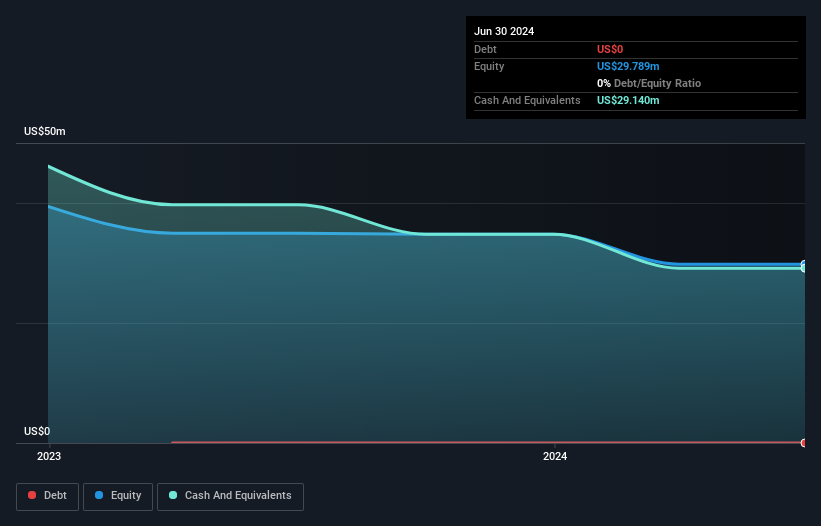Here's Why We're Not Too Worried About Epitomee Medical's (TLV:EPIT) Cash Burn Situation
We can readily understand why investors are attracted to unprofitable companies. For example, although Amazon.com made losses for many years after listing, if you had bought and held the shares since 1999, you would have made a fortune. Nonetheless, only a fool would ignore the risk that a loss making company burns through its cash too quickly.
So should Epitomee Medical (TLV:EPIT) shareholders be worried about its cash burn? In this report, we will consider the company's annual negative free cash flow, henceforth referring to it as the 'cash burn'. Let's start with an examination of the business' cash, relative to its cash burn.
See our latest analysis for Epitomee Medical
When Might Epitomee Medical Run Out Of Money?
A company's cash runway is the amount of time it would take to burn through its cash reserves at its current cash burn rate. In June 2024, Epitomee Medical had US$29m in cash, and was debt-free. Importantly, its cash burn was US$11m over the trailing twelve months. Therefore, from June 2024 it had 2.7 years of cash runway. That's decent, giving the company a couple years to develop its business. The image below shows how its cash balance has been changing over the last few years.

How Is Epitomee Medical's Cash Burn Changing Over Time?
In our view, Epitomee Medical doesn't yet produce significant amounts of operating revenue, since it reported just US$10m in the last twelve months. As a result, we think it's a bit early to focus on the revenue growth, so we'll limit ourselves to looking at how the cash burn is changing over time. As it happens, the company's cash burn reduced by 20% over the last year, which suggests that management are maintaining a fairly steady rate of business development, albeit with a slight decrease in spending. Of course, we've only taken a quick look at the stock's growth metrics, here. You can take a look at how Epitomee Medical has developed its business over time by checking this visualization of its revenue and earnings history.
Can Epitomee Medical Raise More Cash Easily?
While Epitomee Medical is showing a solid reduction in its cash burn, it's still worth considering how easily it could raise more cash, even just to fuel faster growth. Issuing new shares, or taking on debt, are the most common ways for a listed company to raise more money for its business. Commonly, a business will sell new shares in itself to raise cash and drive growth. We can compare a company's cash burn to its market capitalisation to get a sense for how many new shares a company would have to issue to fund one year's operations.
Epitomee Medical's cash burn of US$11m is about 17% of its US$65m market capitalisation. As a result, we'd venture that the company could raise more cash for growth without much trouble, albeit at the cost of some dilution.
How Risky Is Epitomee Medical's Cash Burn Situation?
As you can probably tell by now, we're not too worried about Epitomee Medical's cash burn. For example, we think its cash runway suggests that the company is on a good path. Its weak point is its cash burn relative to its market cap, but even that wasn't too bad! Considering all the factors discussed in this article, we're not overly concerned about the company's cash burn, although we do think shareholders should keep an eye on how it develops. On another note, Epitomee Medical has 3 warning signs (and 1 which shouldn't be ignored) we think you should know about.
If you would prefer to check out another company with better fundamentals, then do not miss this free list of interesting companies, that have HIGH return on equity and low debt or this list of stocks which are all forecast to grow.
Have feedback on this article? Concerned about the content? Get in touch with us directly. Alternatively, email editorial-team (at) simplywallst.com.
This article by Simply Wall St is general in nature. We provide commentary based on historical data and analyst forecasts only using an unbiased methodology and our articles are not intended to be financial advice. It does not constitute a recommendation to buy or sell any stock, and does not take account of your objectives, or your financial situation. We aim to bring you long-term focused analysis driven by fundamental data. Note that our analysis may not factor in the latest price-sensitive company announcements or qualitative material. Simply Wall St has no position in any stocks mentioned.
 Index Options
Index Options CME Group
CME Group Nasdaq
Nasdaq Cboe
Cboe TradingView
TradingView Wall Street Journal
Wall Street Journal